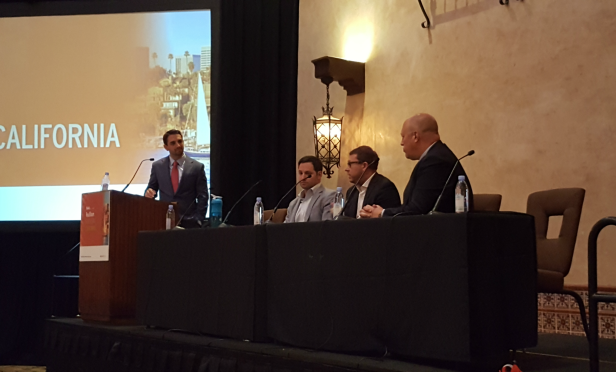 “We are freaking out like retail is going away,” exclaimed Clark Briner, founder and president at Revere Capital, on the Capital Markets Update: What's In Store for 2018 panel at RealShare Southern California. While there are a lot of headline about the failure of retail, Briner pointed out that the ratio is 90 to 10, and our brick and mortar presence isn't going anywhere. The panel included speakers Michael Klein, co-Founder and CEO at Freedom Financial Funds; Bryan Shaffer, principal and managing director at George Smith Partners; and Zach Murphy, co-founder and managing director at Pender Capital, with moderator Marc Renard, managing director of capital markets at Cushman & Wakefield.
“We are freaking out like retail is going away,” exclaimed Clark Briner, founder and president at Revere Capital, on the Capital Markets Update: What's In Store for 2018 panel at RealShare Southern California. While there are a lot of headline about the failure of retail, Briner pointed out that the ratio is 90 to 10, and our brick and mortar presence isn't going anywhere. The panel included speakers Michael Klein, co-Founder and CEO at Freedom Financial Funds; Bryan Shaffer, principal and managing director at George Smith Partners; and Zach Murphy, co-founder and managing director at Pender Capital, with moderator Marc Renard, managing director of capital markets at Cushman & Wakefield.
While it may be true that retail isn't in as much trouble as the industry narrative suggests, Renard said that most of it is commodity retail, and it does warrant caution. He specifically said that B- and C-class malls are a tremendous concern from a capital markets and investment perspective. He wasn't alone. Murphy said that in New York City—which tends to run ahead of economic shifts in other major markets—retail is in bad shape. “Retail in New York is a disaster. The vacancy is unbelievable,” he said on the panel, adding that there are vacancies everywhere and rates are falling as a result.
Klein, on the other hand, is focusing on retail. In fact, about half of his company's business is retail. “You have to dig in and ask what kind of retail is it,” he said, acknowledging that there is “good” and “bad” retail in this market, and that much of the quality of the retail is based on location and the tenant mix. Consumers are shopping, but a lot of the traffic is driven by strong brands. “You have to look at competition at the center to understand what the tenant base would be. If it is a no-name retailer, I am not excited to finance that.”
Historically, there is a good case for retail as well. Klein adds that one of the reasons the firm has remained bullish on shopping centers, especially those anchored by a grocery store, is because it withstood the financial crisis. “The market center withstood the last downturn fairly well, and it is withstanding ecommerce. People like to go to the market.” Of course, you have to be prudent, which is true of every investment, but Klein says that people will continue going to the market and that will keep retail centers relevant.
He is actually so bullish on retail that for the right deal, he is willing to lend aggressively. For example, the firm financed a build-to-suit retail project with Starbucks signed on as a lease. Because of the strong tenancy, it funded 95% LTV of the project. “That is an exciting deal for us, and we get what we believe is a good risk adjusted return,” said Klein. “Our investors get a 9% yield with that.”
© Touchpoint Markets, All Rights Reserved. Request academic re-use from www.copyright.com. All other uses, submit a request to [email protected]. For more inforrmation visit Asset & Logo Licensing.






